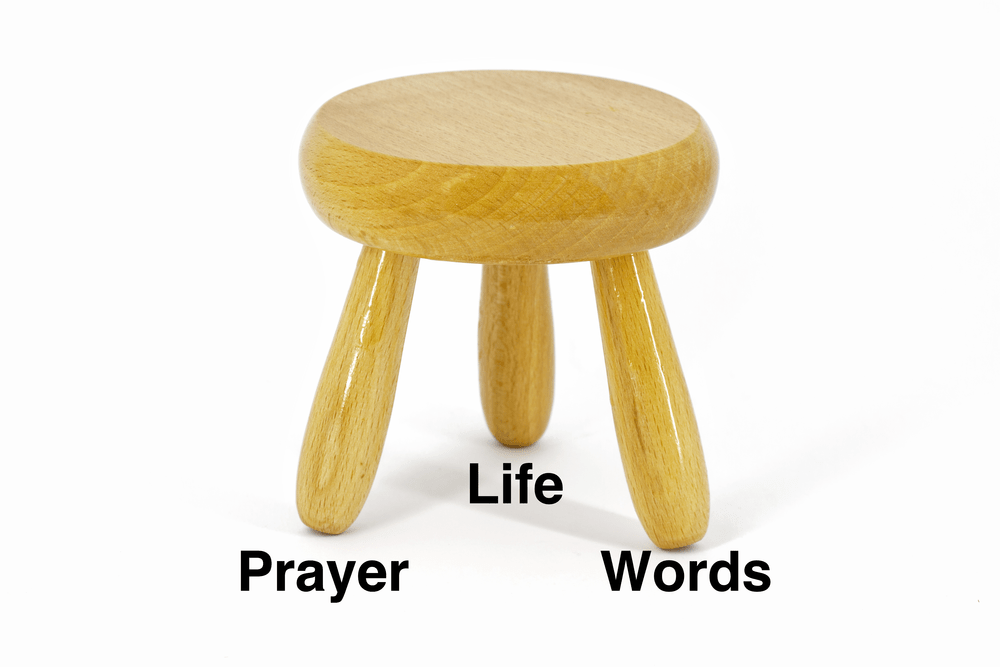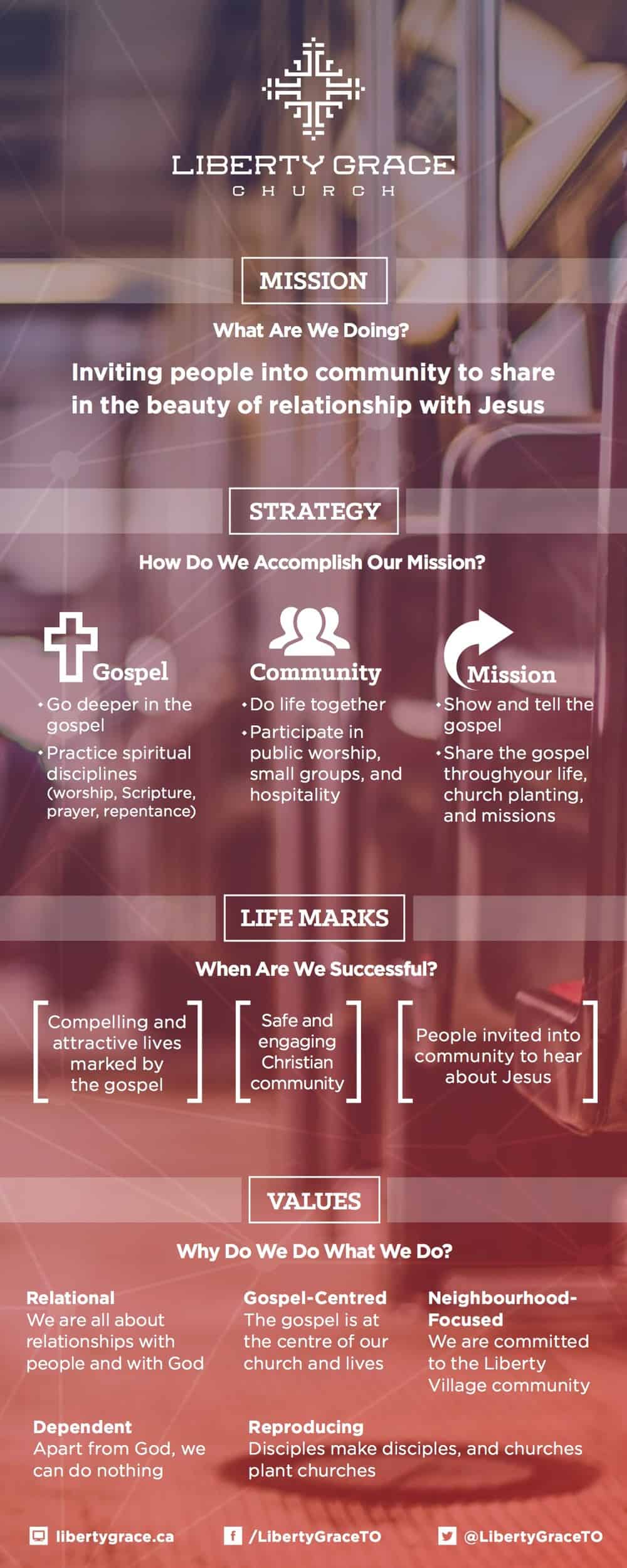Vision: Mission (Colossians 4:2-6)

Big Idea: What’s it going to take to show and tell the gospel to resistant people? It’s going to take three things: prayer, life, and words.
Every month or so, around dinner time, I get an annoying call from a telemarketer. It’s always the same company, and they’re always trying to sell me the same thing: a furnace. And every time I tell them the same thing. I live in a condo. I have no use for a furnace. They always apologize, but then they call back the next month. They just won’t give up. No matter how many times they call, I’m just not in the market for a furnace.
I wonder sometimes if that’s how people feel about us. We’re here today as a church talking about our strategy. This weekend we’re celebrating our second anniversary. Two years ago we held our first service as a brand new church, and right now we’re replanting the church so that we’re as clear as possible about what we’re here to do.

And so we’ve talked about our very simple strategy:
Gospel — We exist to go deeper and deeper into the gospel — the good news that God has rescued sinners through the finished work of Christ. We want a gospel doctrine and a gospel culture. We want to keep coming back to Jesus and what he’s done for us. It’s how we begin the Christian life, and it’s how we grow in the Christian life as well.
Community — We also want to experience the kind of community that the gospel creates. The gospel always creates a community. We want to drop the masks and find safety here. Next week we’re beginning small groups, because we believe that the gospel creates community, and Christian growth necessitates community.
Mission — Our church is also about mission. We want people who’ve never heard of the gospel to hear it. We’re here because a lot of people have not heard the good news about Jesus, and we want to experience the beauty of relationship with Jesus.
As we think about missing today — of showing and telling the gospel — we need to face some questions. How do we share the gospel in a community in which many seem to be resistant? How can we share the gospel effectively, when it sometimes feels like we’re about as welcome as the furnace telemarketer? How can we — ordinary people like us — live on mission?
Here’s our problem. We live in what many call a post-Christendom culture. That means that church seems like it’s a fine option for some, but it’s not on the radar of most people. I have a friend who moved from Nashville. He told me that in Nashville, one of the first questions you’d hear is, “Have you found a church yet?” When they moved to Toronto, they discovered that you could be asked twenty or fifty questions when you moved in, but that wouldn’t be one of them. We’re not just dealing with unchurched people who may come back with the right programs or music; we’re dealing with resistant people who don’t think that Jesus or the church have anything to offer them.
I don’t want to overstate the case, because I believe that there are still many people who are open to the gospel. I believe that God is still at work in the lives of many people in this community. But we do have to face the reality that things have changed. Tim Chester and Steve Timmis say this:
If we could place people on a range of one to ten depending on their interest in the gospel, where one is no interest and ten is a decision to follow Christ, lots of evangelism assumes people are at around eight. We teach our gospel outlines. We teach answers to apologetic questions. We hold guest services. We put on evangelistic courses. We preach in the open air or knock on doors. All these are great things to do, but 70 percent of the population is at one or two. (Everyday Church)
Given this, how do we live on mission? How do we show and tell the gospel, sharing the gospel through our lives so that people are invited into community to hear about Jesus?
It’s going to be harder than before. In his book Honest Evangelism, Rico Tice says that people used to generally understand the gospel, so that when Billy Graham came to town, they were ready to be invited and to respond. But then things changed. People began to hold beliefs or objections that had to be dealt with before they could respond to the gospel. Some of the beliefs are: Christians are weird. Christianity is untrue. Christianity is irrelevant. Christianity is intolerant. So you had to work to deal with thee objections and build their trust. Now, things have changed even more. Our culture is defined by tolerance and permissiveness. People don’t engage with faith; they simply dismiss it. Jesus simply isn’t on the agenda; he isn’t even an option to be considered. People don’t think about why they disagree with Christianity; they just think it’s fine for you and not for them. As a result, evangelism takes time and effort. It’s rare to see a person become a Christian very quickly. Things have changed, and in some ways our evangelism has to change as well.
In fact, our evangelism has to change to be closer to what we read about in the Bible, because our situation is closer to the age of the apostles now than it was a few years ago. There’s lots of hope. In today’s passage, Paul is writing to the Colossians, and he gives three important clues about how we can share the gospel in a gospel-resistant culture. What’s it going to take to show and tell the gospel to resistant people? It’s going to take three things: prayer, life, and speech. We’re really going to need all three, because one or two alone probably won’t get the job done.
Let’s look at each one.
First: It’s going to take prayer.
Paul writes in verses 2-3:
Continue steadfastly in prayer, being watchful in it with thanksgiving. At the same time, pray also for us, that God may open to us a door for the word, to declare the mystery of Christ, on account of which I am in prison—that I may make it clear, which is how I ought to speak. (Colossians 4:2-4)
If we’re going to share the gospel, it’s going to take prayer. “What opens the door, again and again, is prayer” (N.T. Wright). We have a role, but if we ever think that we can accomplish what God has given us to do without prayer, then we’re delusional. How do we show and tell the gospel when many people are resistant? Pray. It always begins with prayer.
One of the things I love about this command is that it’s so accessible. The Colossians were brand new Christians. They were just taking their first steps in the Christian life. Paul was an accomplished missionary who had been halfway around the northern Mediterranean preaching and planting churches. What could the Colossians possibly do to help him? Pray. Prayer isn’t a small thing in evangelism. Paul recognized that unless God opens the door, and unless God enables us through the Spirit, then we’re sunk. Prayer is essential to evangelism.
Notice that Paul doesn’t just say to pray. He says to continue steadfastly in prayer. This is especially important in contexts in which people are resistant, and opposition is expected. We simply can’t do this without prayer. The only way that we can plant this church evangelistically, and see people come to Christ, is if we devote ourselves to prayer.
Friends of mine went to Thailand and India this summer. They both have jobs here in Canada, but they see themselves as missionaries here in Toronto. Their passion is to see people come to know Christ in their neighborhood and workplaces. So they travelled to Thailand and India, and met missionaries there. They wanted to learn lessons about what effective missionaries do there, so that they could be more effective ministries here.
When I saw them a few weeks back, they were changed. They told me that the missionaries said, “We don’t understand what you Christians are trying to do back in North America. You are trying to serve God, but you’re doing it without prayer.” My friends told me that the main thing they learned is that if we are going to get the job done, especially in a resistant setting, it’s going to take prayer. Not just general prayer, but tactical prayer. We’re going to have to ask God to give us insight into particular situations, as well as to pray that he opens doors, and gives us clarity. How do we show and tell the gospel to resistant people? It begins with prayer.
Hudson Taylor, a missionary in China in the 1800s, had a mission station that was particularly effective. There was no accounting for it, because they other stations were equal in devotion and ability. Hudson Taylor was traveling and speaking in England, and after a meeting a man came up and began to ask him about that particular station. Then he began to ask many personal questions. It turned out that the man had been the college roommate of the missionary at that station many years earlier, and he had committed himself to daily praying for the work there. Hudson Taylor said, “Then I knew the answer.”
So pray. I encourage you to pray for individual people, to pray for evangelism in our church overall. I have a friend who walks into a coffee shop and prays that God would direct him to the right person. Pray! Our whole ministry must be bathed in prayer — and certainly our evangelism must be.
This is essential, but it’s not everything. What’s it going to take to show and tell the gospel to resistant people? Prayer, but something else too:
Second: it’s going to take our lives.
Paul writes: “Walk in wisdom toward outsiders, making the best use of the time” (Colossians 4:5). “Walk” is a term that refers to the way we live our lives. In other words, Paul is talking about lifestyle evangelism. He tells us that our lives should be compelling demonstrations of the gospel.
But then Paul says that the way that our lifestyles should be marked by wisdom toward outsiders. Paul wants Christians, a minority in a hostile environment, to engage others effectively in proclaiming the gospel. He wants ordinary Christians to demonstrate Christ’s teaching in their lives as they relate to others. It’s about living everyday life with gospel intentionality. Not only that, but he wants us to make the best use of our time. Time is short, and we shouldn’t squander opportunities to evangelize others.
In his book Saturate, Jeff Vanderstelt explains what this can look like. He says that our evangelism can’t be based primarily on church events, because then we’ll be too busy for relationships with people who don’t go to church. Besides, if evangelism is mainly about church events, then evangelism will only happen once or twice a week. Instead, Vanderstelt says:
It must involve everyday life. We need to see that life is the program, because people need to see what it means to follow Jesus in the everyday stuff of life.
We realized we needed to help our people see that life has a normal rhythm. All people everywhere are engaged in things that happen in rhythm— day in and day out. When we engage in these everyday rhythms with Jesus-centered, Spirit-led direction, mission can happen anytime and everywhere, and anybody can be a part of it.
We needed to train people how to live everyday life with gospel intentionality, showing what it looks like to follow Jesus in the normal stuff. So we asked ourselves: “What are the everyday rhythms of life that everybody engages in everywhere? How can we engage in what is already going on? And how does our submission to Jesus change how we do it?” We knew that if we identified the everyday rhythms of life and trained people to engage in them in light of the gospel with the purpose of making disciples, they would be better equipped to be disciples of Jesus anywhere and everywhere.
Vanderstelt lists six things that we do regularly. All of these are opportunities for us to showcase the gospel in our lives:
- Eat — “You’re already eating, probably three times a day. Don’t do it alone. Do it with others and watch Jesus join you at the table and change the meal.”
- Listen — “Quiet your soul and listen to God. And close your mouth once in a while and listen to others. Do both together, and you will find yourself joining in with the activity of the Spirit…”
- Story — “Know and rehearse God’s story, learn others’ stories, and consider how aspects of God’s story can bring redemption and restoration to theirs.”
- Bless — Bless others, especially those who don’t deserve it. I heard this week from someone who feels under-appreciated at work. Rather than withdrawing or lashing out, she looks for ways to bless these people, and to treat them better than they deserve, just like Jesus has done for her.
- Celebrate — Everybody celebrates. Join the celebrations around you, and make them better. Serve. Show people what Kingdom joy looks like.
- Re-create — Use your hobbies and downtime as ways to connect with others, and to show what true rest in Jesus looks like.
“Live in such a way that it would demand a ‘Jesus explanation,’ Vanderstelt says. That’s exactly what Paul is saying. In our strategy card, we talk about living compelling and attractive lives marked by the gospel. In a resistant culture, that’s what it takes.
Listen: If you understand the gospel, and your life is being changed, then your life will be different. If you eat with others, really listen to others as you listen to the Spirit, if you bless your enemies, and if your life is marked by humility and joy, then it will stand out. Your life will demand a “Jesus explanation.”
What’s it going to take to show and tell the gospel to resistant people? Pray, and then live your life with gospel intentionality. But there’s one more thing that Paul tells us:
Finally: It’s going to take our words.
Colossians 4:6 says, “Let your speech always be gracious, seasoned with salt, so that you may know how you ought to answer each person.” I love what Paul says here. A lot of people think that when Christians talk with people who aren’t Christians, the tone is going to be harsh and judgmental. We’re going to have to set everyone straight. That’s not what Paul says, though. We’re to be gracious to others. It should also be seasoned with salt. That means that our speech to others shouldn’t be boring, but appealing to others. It should leave them wanting more.
I especially appreciate how verse 6 ends: “so that you may know how you ought to answer each person.” There is no cookie-cutter approach. We’re going to get questions about the Christian faith. Some of them are going to be difficult, maybe even hostile. Paul tells us to grow in our ability to answer these questions, but in a way that makes the gospel attractive. One commentator puts it this way: Paul expects the Colossian church “to hold its own in the social setting of marketplace, baths, and meal table and to win attention by the attractiveness of its life and speech” (James Dunn).
I want to emphasize that this doesn’t mean that we have all the answers. Many times we can tell people that they have a good question, and that we’ll get back to them. That’s much better than bluffing our way through an answer that doesn’t cut it! It does mean that we are growing in our ability to answer questions and to share the gospel.
St. Francis of Assisi is sometimes misquoted, “Preach the gospel. Use words if necessary.” There’s actually no record of him saying such a thing, which would be funny coming from a man who preached five times a day. He had no problem using words. Besides, as Paul tells us here, sharing the gospel will take our words. We can’t live out the gospel or be the gospel to others. We must speak the gospel. A godly, compelling life is important, but at some point we will need to also tell people about Jesus. So use your words. Be gracious and winsome, but speak of Jesus. Make him the hero. He is worth it.

Most of us are scared of evangelism. Most of us think we can’t do it. Not only that, but we’re overwhelmed in a culture that seems resistant, even hostile sometimes, to the message.
Today’s passage gives me hope. When Paul wrote this letter, he wrote in a setting that was even more hostile to the Christian message. As Paul wrote these words, he was in prison for the gospel, and yet he is full of hope. He writes to a group of new Christians and is full of hope that they will be able to share the gospel effectively. What’s it going to take to show and tell the gospel to resistant people? It’s going to take three things: prayer, life, and words. It may take time. But with God’s help we can do it.
God uses ordinary people like us. Many sociologists have now recognized that “most conversions are not produced by professional missionaries conveying a new message, but by rank-and-file members who share their faith with their friends and relatives” (David W. Pao). God can use us as we pray, as we live ordinary life with gospel intentionality, and as we point to Jesus with our words in as winsome a way as possible.

I want you to take the strategy card that we’ve given you. This is our entire strategy as a church. We want to go deeper in the gospel, deeper into community, and father into mission as a church. It’s not complicated. This is as accessible for all of us, and yet it’s deep enough that we could spend our entire lives doing this.
God wants to use you in a resistant culture to spread his gospel. I want to ask you to apply this today:
- Pray — Who can you pray for? I have prayer cards, and I flip through them daily as I pray for people. Who can you pray for in your network of relationships? Could you also pray for us as a church, that God would grant us open doors, and that we would be bold to speak the gospel?
- Live — How can you live your life with gospel intentionality? How can you walk wisely, making the most of every opportunity? How can you eat, listen, story, bless, celebrate, and recreate so that your life demands a Jesus explanation?
- Speak — How can you speak the gospel? How can you make your faith an everyday, natural part of your conversations with other people? How can you ask questions, pray for opportunities, and then be ready for an opening?
Paul had every confidence that God could use ordinary, baby Christians in a resistant setting. I have every confidence that God can do the same though us. God is on mission, and he can use us as we show and tell the gospel through our lives.





